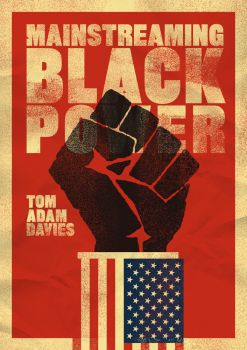Compelling and innovative study of Black Power receives nomination for prestigious first book prize
By: Neil Vowles
Last updated: Tuesday, 3 July 2018

American History lecturer Dr Tom Davies has been shortlisted for the prestigious 2018 Gladstone Prize

Dr Tom Davies has been shortlisted for the prestigious 2018 Gladstone Prize organised by the Royal Historical Society.
The American History lecturer has been named on the shortlist of five for the award, which recognises an author's first solely written book on a historical subject which is not primarily related to British history.
His book, Mainstreaming Black Power, has been warmly received by readers on both sides of the Atlantic, with favourable reviews describing it as a “compelling”, “innovative”, “insightful” and “ the most substantive and significant study of the impact of Black Power on the American political mainstream”.
The book, which was published last year by University of California Press, was already named the runner-up in the British Association for American Studies 2018 Book Prize competition in April.
The winner of the award, which was created in 1998 to mark the centenary of the death of former Prime Minister William Gladstone and comes with a prize of £1,000, will be announced on Friday 6 July.
Dr Davies said: “To have made it on to the shortlist is a real honour. Of course, I would be delighted to win the award outright - but, whatever happens on 6 July, it’s been very gratifying to have made it this far in the competition and to have had the book recognised in this way.”
Dr Davies said the book originally grew out of his MA dissertation, which explored the relationship between the federal government and the Black Power movement, which he then expanded for his PhD to explore how and why white mainstream politicians and institutions, from across the political spectrum, engaged with Black Power and what the consequences of their efforts to engage with Black Power ultimately were.
He added: “My interest in US history more generally evolved from my module choices as a second-year undergraduate History student. I had never really studied American history before that point and signed up for two modules, on the 19th and 20th centuries respectively. In the course of taking those modules I began to develop a real interest in US history, and in the African American freedom struggle in particular, and so in my final year I took a special subject class on the civil rights movement. And I’ve been delving further into that history – and many other adjacent and related areas of US history – ever since.”
Dr Davies is continuing his focus on the US in the 1960s and 70s and is currently in the process of finishing an article on New York city government under Mayor John Lindsay; he also has plans for another piece on black athletes, white liberals, and protest at the Mexico City 1968 Olympics.
A follow-up to Mainstreaming Black Power is also in the pipeline, which will focus on the role of capitalism, technology, and infrastructure development in widening socio-economic inequality in the post-1960s US.
Dr Christopher Warne, Joint Head of the Department of History, said: “The Gladstone Prize recognizes outstanding work carried out in the UK on topics and themes of international and global history, and also identifies genuine rising stars whose work promises to open up new pathways into the study of the past.
“In that respect, it is no surprise that Tom Davies has been nominated for this prize. His book combines careful scholarship and extensive research, with an innovative approach to the legacies of Black Power politics in the US. It obliges us to look beyond the hitherto more commonly studied revolutionary movements in order to fully understand the broader impact of this aspect of the civil rights movement.
"His work is also of immediate relevance for understanding the current situation in the US and its continued entanglement in the politics of race."
Dr Doug Haynes, Director of Sussex Centre for American Studies, said: "This outstanding work from an outstanding Sussex scholar makes sense of the complex post-Civil Rights era and points the way to post Ferguson US race politics.”
